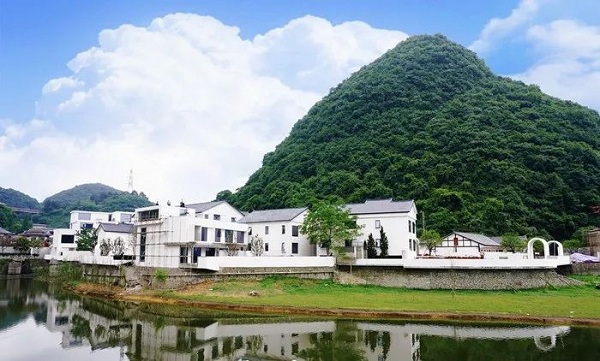Village in Qingzhen balances ecology with economy

The clean lake surface is seen in Hongfenghu town, Qingzhen, Guiyang, Southwest China's Guizhou province. [Photo/Guiyang news network]
The Hongfenghu scenic spot used to be the first stop on Guizhou's west tourism route, and was popular from the end of the 1990s until the beginning of the 21st century. The government designated the town as one of Guiyang's key origins of drinking water in 2010, and since then Hongfenghu has redoubled its efforts to improve its ecological health. Dachong village has played a leading role in this quest.
Garbage disposal is a crucial part of environmental protection. Lin Kezhong, head of Dachong village, spoke of how their waste disposal work began.
"We first assigned a man to collect all the recyclable waste from every household, then we instructed villagers how to classify the rest of the garbage," Lin said. "Finally, workers from the recycling station offered door-to-door services, and weighed the classified garbage. The recycling commission was calculated in terms of the weight of garbage, and was used to pay for the water bills. Villagers have been greatly motivated by this practice."
Hongfenghu town has learnt from the successful experience gained in Dachong village.
As Guiyang's most important reservoir of drinking water, Hongfenghu town's ecological red lines cannot be crossed. Qingzhen has so far launched two rounds of resident relocation work for ecological purposes. Villagers living in the first-grade drinking water source protection zones have all been relocated to other places. Farm stays in second-grade drinking water source protection zones have been required to close. Life sewage processing equipment has also been put in place to guarantee the safety of drinking water.
But in Dachong village, farm stays are the backbone of the local economy, since they not only bring tourists, but also boost the local trade in fruit and vegetables, and provide more job opportunities to rural residents. How did they strike a balance between economic development and protecting drinking water sources?
"We have spent 200,000 ($30,000) to 300,000 yuan on sewage processing devices," said Chen Huayan, who is in charge of a local farm stay in the village. "After being processed by our own devices, the polluted water will be led to a large-scale sewage disposal system to be purified again."
Lin Kezhong believes that villagers are confident about future development. "Since we have these precious natural resources, we'd better increase their economic efficiency," Lin said.
Presented by China Daily.
黔ICP备05001922号-3
